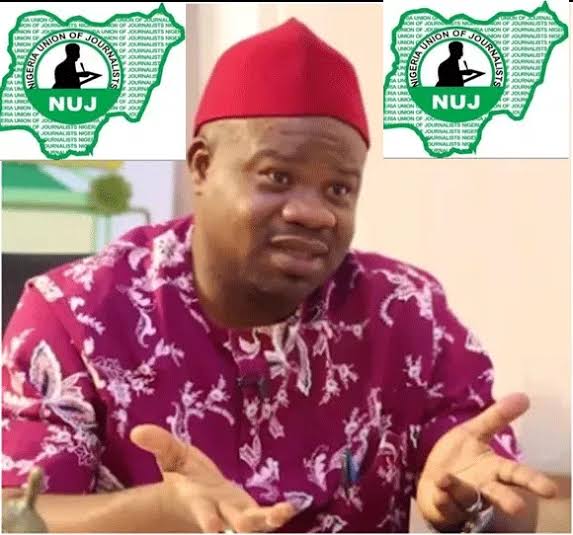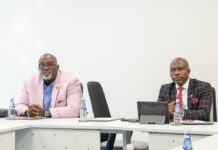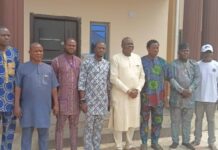Speech by the President of the NUJ at the Opening Ceremony of a One-Day Workshop on “The Power of the Pen in the Fight against Corruption” organised by the ICPC in collaboration with the NUJ in Abuja on Monday, October 21, 2024.
It is with great honor that I welcome you all to this workshop on “The Power of the Pen in the Fight Against Corruption,” a critical initiative organized by the Independent Corrupt Practices and Other Related Offences Commission (ICPC) in collaboration with Nigeria Union of Journalists (NUJ) and with the generous support of the MacArthur Foundation. I extend my profound gratitude to the ICPC for their ongoing efforts in the fight against corruption and to the MacArthur Foundation for its commitment to advancing good governance in Nigeria.
Today, we are gathered here as journalists from across the nation, united by a shared goal: to explore the immense potential of the media as a force for positive change, especially in combating corruption. Corruption remains one of the greatest impediments to Nigeria’s progress. It undermines development, widens inequality, and perpetuates a cycle of poverty and instability. As journalists, we hold the power to shine a light on these injustices, to expose the truth, and to advocate for the transparency and accountability that are the bedrock of any functioning democracy.
The Role of Journalists in the Fight Against Corruption
Journalists are the eyes and ears of society. We are often the first to uncover and report on the underhand dealings that threaten the nation’s future. The power of the pen is undeniable: it can expose corruption, challenge those in power, and empower citizens to demand accountability. In the fight against corruption, our role is multi-faceted and indispensable:
1. Exposing Corruption Through Investigative Journalism:
Investigative journalism is perhaps one of the most important tools in exposing corruption. It is the relentless pursuit of hidden truths, uncovering illicit activities that corrupt officials and entities would prefer to keep in the shadows. By investigating and reporting on financial mismanagement, abuse of power, bribery, and fraud, journalists provide the public with the information they need to hold perpetrators accountable. This is not an easy task, but it is one that can yield significant change when pursued with integrity and dedication.
2. Raising Public Awareness and Mobilizing Citizens:
The media serves as a bridge between the government and the people. Our reports shape public opinion, inform decision-making, and mobilize citizens. When corruption is exposed, it is the public’s outrage and demands for justice that often lead to action. In this way, journalists do more than report the news—we drive social change by engaging citizens and encouraging civic participation. It is through public pressure that governments are forced to act and corrupt officials held accountable.
3. Creating a Culture of Transparency and Accountability:
Our consistent reporting on corruption can foster a culture of transparency in public and private institutions. When individuals and organizations know that their actions are being scrutinized by the media, it can deter corrupt behavior. The fear of exposure often forces officials to think twice before engaging in illegal or unethical activities. Journalism, therefore, acts as a check on power, reminding those in authority that they are accountable to the people.
4. Collaborating with Anti-Corruption Agencies:
The fight against corruption is not one we can wage alone. It requires collaboration with anti-corruption agencies, such as the ICPC, to create a unified front. Through partnerships, we can ensure that our efforts as journalists are amplified, that the investigations we conduct lead to real change, and that those involved in corrupt practices face legal consequences. This workshop serves as a platform to strengthen that partnership, and I am confident that through our collective efforts, we can bring about a more transparent and accountable Nigeria.
The Need for Security and Protection of Journalists
While our role in combating corruption is crucial, we cannot ignore the inherent dangers that come with it. The fight against corruption is, in itself, a risky venture. Journalists who expose corruption often face threats to their lives, intimidation, harassment, and, in some cases, physical violence. Unfortunately, these risks are all too real in Nigeria and other parts of the world.
The safety and security of journalists must be a top priority if we are to continue this essential work. The NUJ, along with our partners, must advocate for stronger protections for journalists who take on the dangerous task of exposing corruption. There is an urgent need for laws that not only protect freedom of the press but also ensure that journalists can carry out their duties without fear of retaliation.
Journalists should not be forced to choose between their duty to the public and their personal safety. We need comprehensive policies that guarantee the security of investigative journalists and whistleblowers, ensuring that their important work does not result in harm. This includes creating mechanisms for reporting threats, providing legal support, and fostering a safe environment where journalists can carry out their work with confidence.
I call on the government, civil society organizations, and media owners to ensure that journalists are well-equipped and protected, both physically and legally, to investigate and report on corruption without interference. The pen is mightier than the sword, but it must be wielded with safety in mind.
Communication for Social Change
Beyond exposing corruption, journalism plays a vital role in communication for social change. Through storytelling, we can shift narratives and challenge the status quo. We can highlight the human cost of corruption—how it robs communities of essential services, deepens poverty, and stifles opportunities for future generations. By framing our stories around the impact of corruption on ordinary citizens, we can move beyond mere reporting to inspiring action.
Journalists are not just witnesses to corruption; we are advocates for justice. Our stories have the power to provoke thought, spark debates, and inspire reforms. Communication for social change means that our work must aim to change mindsets, policies, and practices. It requires us to engage with the public on a deeper level, creating dialogues that lead to long-term, sustainable change.
Conclusion
As we embark on today’s discussions, let us keep in mind the immense responsibility that we carry as journalists. We are not just reporters; we are change-makers. In the fight against corruption, we have a unique opportunity to reshape our society, to make it more just, transparent, and accountable.
I urge you all to take full advantage of this workshop, to engage meaningfully with the sessions on investigative journalism, ethical standards, and data journalism. Let us strengthen our collective resolve to continue the fight against corruption, knowing that we are not alone but part of a wider movement for justice and integrity.
Once again, I thank the ICPC for their commitment to transparency and good governance, and I express my gratitude to the MacArthur Foundation for supporting this important initiative.
Together, let us wield the power of the pen to bring about the Nigeria we all deserve—a nation free from the shackles of corruption, where justice and fairness reign supreme.
Thank you, and may God bless the NUJ and the Federal Republic of Nigeria.






